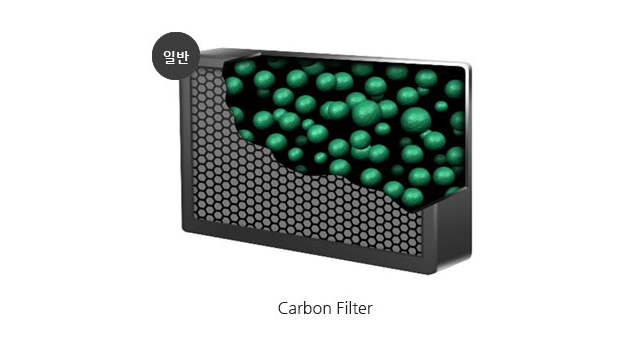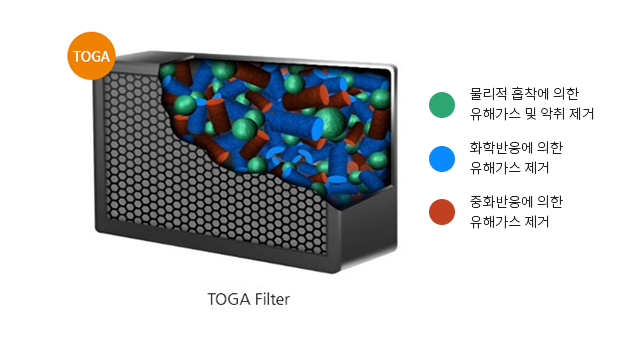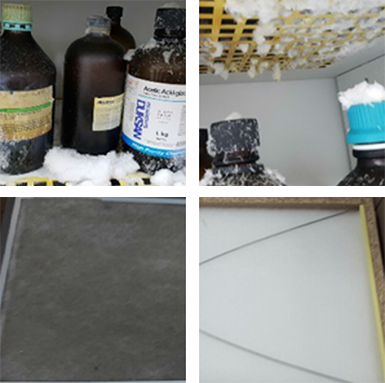본 사이트에서는 최상의 사용자 환경을 제공하기 위해 쿠키를 사용하고 있습니다. 계속해서 사이트를 이용하는 경우, 본 사이트의 쿠키 수신에 동의한것으로 간주됩니다.
쿠키 정책
Green Technology Science & Environment FILTER
GT SCIEN strives to create safer laboratories through continuous research and development.

- Filter
- TOGA® Filter
Notice: Undefined offset: 3 in /var/www/html/html/_skin/seil/layout/inc_navigation_middle.php on line 86
TOGA® Filter

High-efficiency chemical filters are modified and installed into various types of equipment to remove toxic gases and foul odors generated in the laboratory.
The Best Filter for Removing Toxic Gases

Average chemical filters are made up of activated carbon, a processed form of carbon with small, low-volume pores that capture toxic gases and foul odors through physical adsorption. However, activated carbon's efficacy is limited in laboratory environments.

TOGA® filters remove toxic gases at much higher efficiency rates than simple activated carbon by utilizing laboratory-optimized Triple Action Technology™ that combines physical adsorption, chemical reactions and neutralization reactions to eliminate virtually all toxic gases and foul odors in the laboratory.
TOGA® Filter Types
Choose between a three main types of TOGA® depending on your application. Customized filters are also available to handle specific applications, boost removal efficiency and increase filter life.

The Importance of Filter Management and Replacement
-

-
-

-
- Using expired filters puts researchers at risk of toxic gas exposure
- Periodic replacement of filters guarantees that the filter is always working at high efficiency and is keeping you safe
- Proper management and prevention systems ensure researcher safety
-
-
-
-

-
- Frequent exposure to toxic gases can damage equipment, leading to expensive replacements
- Proper management of toxic gas purification systems can reduce costs
-
-
-
-

-
- Active laboratory air quality management provides researchers with a more pleasant work environment
-
-
-

FAQ
What is the TOGA® filter?
TOGA® filters were developed by GT SCIEN to with the goal of purifying toxic gases from the laboratory environment, no matter the chemical, no matter the application. The filters utilize Triple Action Technology™, which innovates on activated carbon filtration by coming physical adsorption with chemical and neutralization reactions to create extremely efficient, longer-lasting filters. TOGA® filters come in types A, B, and C, as well as the Standard filter type, which is a combination of all 3 filter types and is used for general laboratory applications. Customized filters are also available on request to provide solutions specially tailored to your particular application and laboratory environment.
What is the difference between TOGA® filters and other filters?
Carbon or zeolite filters are limited to VOC's removal and are unable to effectively purify acidic or basic gases. As carbon filters rely exclusively on physical adsorption, filters must be replaced every 3-6 months. TOGA® filters boast extremely high purification rates for VOC's, acids, bases and pretty much any chemical used in the laboratory that produces a gas. Due do our innovative technology, our filters last longer than typical carbon filters, with an average replacement rate of once per year, keeping your maintanence costs low.
How do I know how long the filter lasts and when to replace it?
Our filters are designed to last 1 year. A built-in filter alarm will sound when the filter has expired and is ready to be changed.
When replacing the filter, do I replace one of types A, B, or C?
if you select a certain filter type according to your specific laboratory conditions, then 1 TOGA® filter set will provided that has the proper filter type inside.
Can I purchase several filter sets in advance and replace my filters later?
The TOGA® filter contains activated carbon as one of its base components, and carbon will adsorp pollutants in the environment over time even when not installed in one of our products, which will slowly wear down the filter. Therefore, we recommend purchasing filters only when they will be immediately used for replacement.
Can you make custom filters?
Yes. We manufacture Special-type filters that are customized to your specific lab environment, needs, and chemical applications. While our standard filter will work for nearly all applications, going with a Special-type filter may increase purification efficiency and extend filter life.
